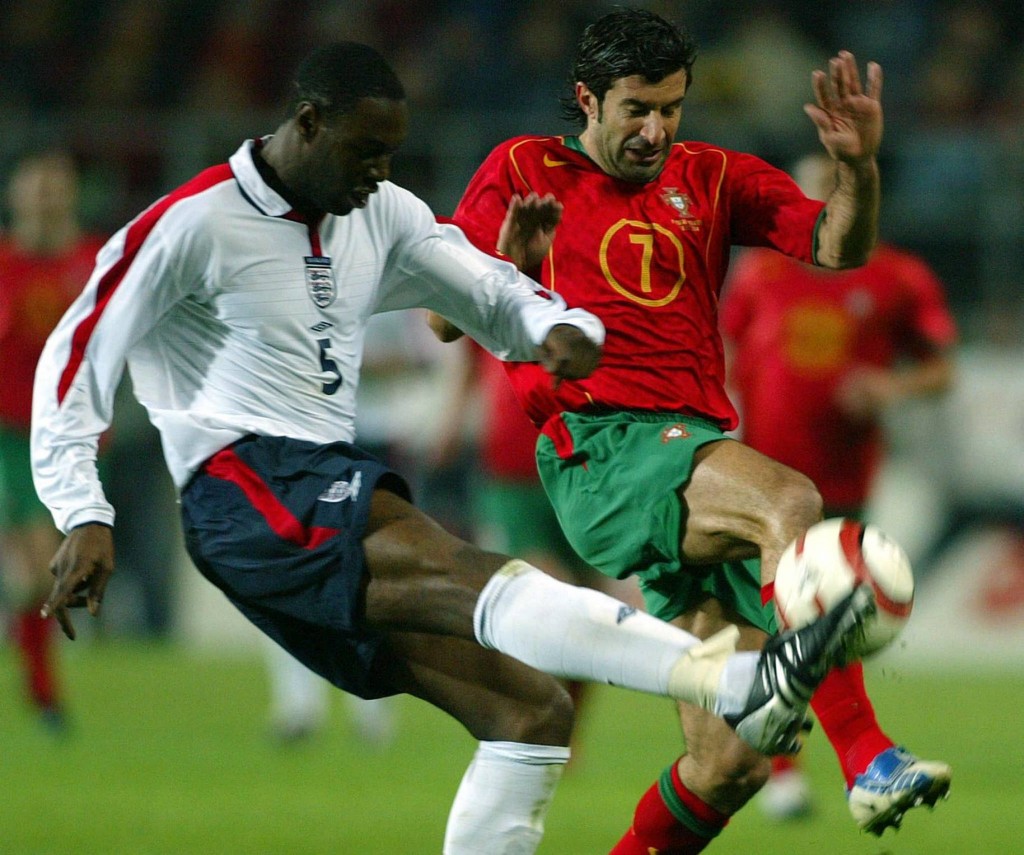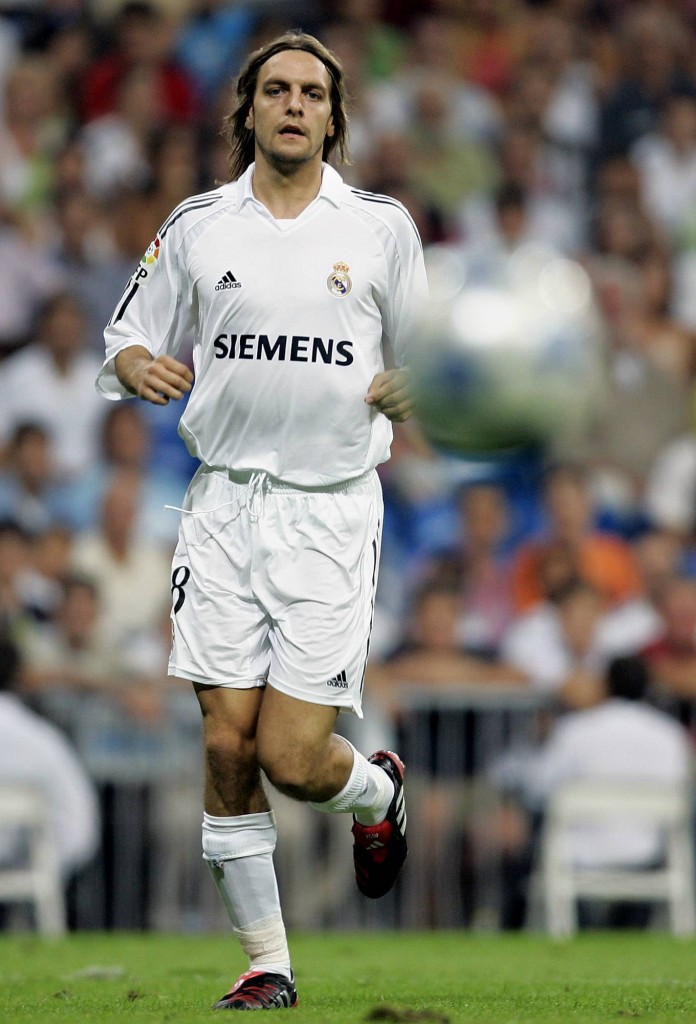During Tottenham Hotspur’s pulsating 2-2 draw at Newcastle United last weekend, Spurs fans witnessed a sadly familiar sight.
It wasn’t that of Rafael van der Vaart getting substituted in the 64th minute looking like he’d just played the full 90-plus extra time, or that of another exciting, talent-filled Harry Redknapp side failing to seek out a victory.
It was the sight of Ledley King, the often absent Spurs captain, leaving the pitch early after yet another injury.

At his peak, Ledley King could rival the best in the world. Here is putting the shackles on Portuguese legend Luis Figo in 2004.
A friend watching the game with me immediately scoffed at his misfortune. Being an England fan, he still remembers the whole fuss about bringing King to the last World Cup, where he lasted all of 45 minutes before being ruled out injured for the rest of the tournament.
But there’s a good reason all the Spurs managers King has worked with since he made his debut in 1999 (and there have been quite a few), and Fabio Capello, have persisted with him despite his constant injuries – he is one helluva player.
He is a freak of nature, sadly both in the sense of his playing ability and his troublesome knees.
When he first emerged as a young central midfielder for Spurs, he seemed to have the world at his feet. Blessed with the skill and composure of Rio Ferdinand, the dominating physical stature of John Terry, and phenomenal pace and balance unlike any other top central defender in the world, he was hailed as the future of Spurs and England.
Even when played out of position in central midfield during his early years, he displayed a fantastic ability to read the game, and was able to dribble his way out of trouble and distribute the ball in an effortless manner that brought comparisons with the great Patrick Vieira. He was truly the complete footballer.
But then the nightmare began.
A chronic knee problem started to rear its ugly head, initially forcing him to miss games, and eventually training altogether.
His condition means that he can only play one game a week, and has to take all the time in between to allow his knees to rest and the swelling in them to subside.
So while other players get to spend the week training and conditioning themselves, King isn’t even allowed to run, meaning he can only do some gym work to keep up with the rest of the increasingly demanding Premier League.
“He plays on Saturday and he comes out the following Friday and has a little jog around for five minutes then plays on a Saturday, so really his body is nowhere near fit,” Redknapp was quoted as saying.
Nowhere near fit. You wouldn’t be able to tell from his performances. Imagine what a force he’d be if he was fully fit.
King himself is philosophical about his injury woes, saying that they might be a huge handicap for him, but they have also helped him become stronger.
“Of course the injury holds me back in one sense. But in another, through having to deal with the adversity of not being able to play every week, and not being able to train, I’ve had to invest heavily in the mental side of things. I believe that, in itself, has made me a more complete player,” he said in an interview.
King could also take encouragement from how many other similarly injury-prone players in the Premier League are now able to manage their bodies enough to make extended comebacks.
Jonathan Woodgate, like King a highly-promising center-back during his early years, played just four games over the last two seasons, also with Spurs.
Back in 2004 when he was signed by none other than Real Madrid, he didn’t even get a single game during his first season, and only managed 14 in his second before Madrid lost patience (as they usually do) and sold him to Middlesborough.

Jonathan Woodgate - good enough to be signed by Real Madrid, injured enough to be voted worst signing of the 21st century.
His many injuries led to Spanish fans voting him as the worst signing of the 21st century.
But now, he’s already managed seven appearances this term with Stoke City, who signed him last summer on a pay-as-you-play deal.
Manager Tony Pulis left him out of Stoke’s Europa League squad to avoid him burning out and getting injured again, but domestically, he’s been instrumental in helping Stoke to seventh place in the league.
Others like Michael Owen, as vehemently as he might deny that he falls into the category of “injury-prone”, have found clubs where they can play different roles.
Being used mainly as an impact substitute, Owen no longer has to worry about the incredible physical demands of playing in the starting XI week-in, week-out.
He no longer plays at 100 miles an hour like he used to either, having adjusted his game to suit his new role at Manchester United as the master goal-poacher.
Owen Hargreaves has also found himself a new role at Manchester City as a squad player. He obviously harbours hope of eventually becoming a first team regular, but considering his hellish experiences with injuries, he’ll be thankful that he’s even playing at all.
But the thing with great players like these who are injury-prone is that they always leave you wondering – what might have been?
Could Owen have retired as England’s greatest striker of all time? Could King have captained England to the World Cup last year? Could Saha have become a Manchester United legend to rival compatriot Eric Cantona? And could a fully-fit Michael Essien have fired Chelsea to the title last season? They all certainly have the attributes to have done so.
But as it stands, we’ll never find out.
The way King sees it, however, goes a long way in soothing that pain of never knowing: “I could spend hours wondering how my career would have been different if the injury hadn’t come along. I’d have played more often, I hope, but maybe I wouldn’t have had the mental reserves that now form such an important part of my game.”

Tell us what you think!